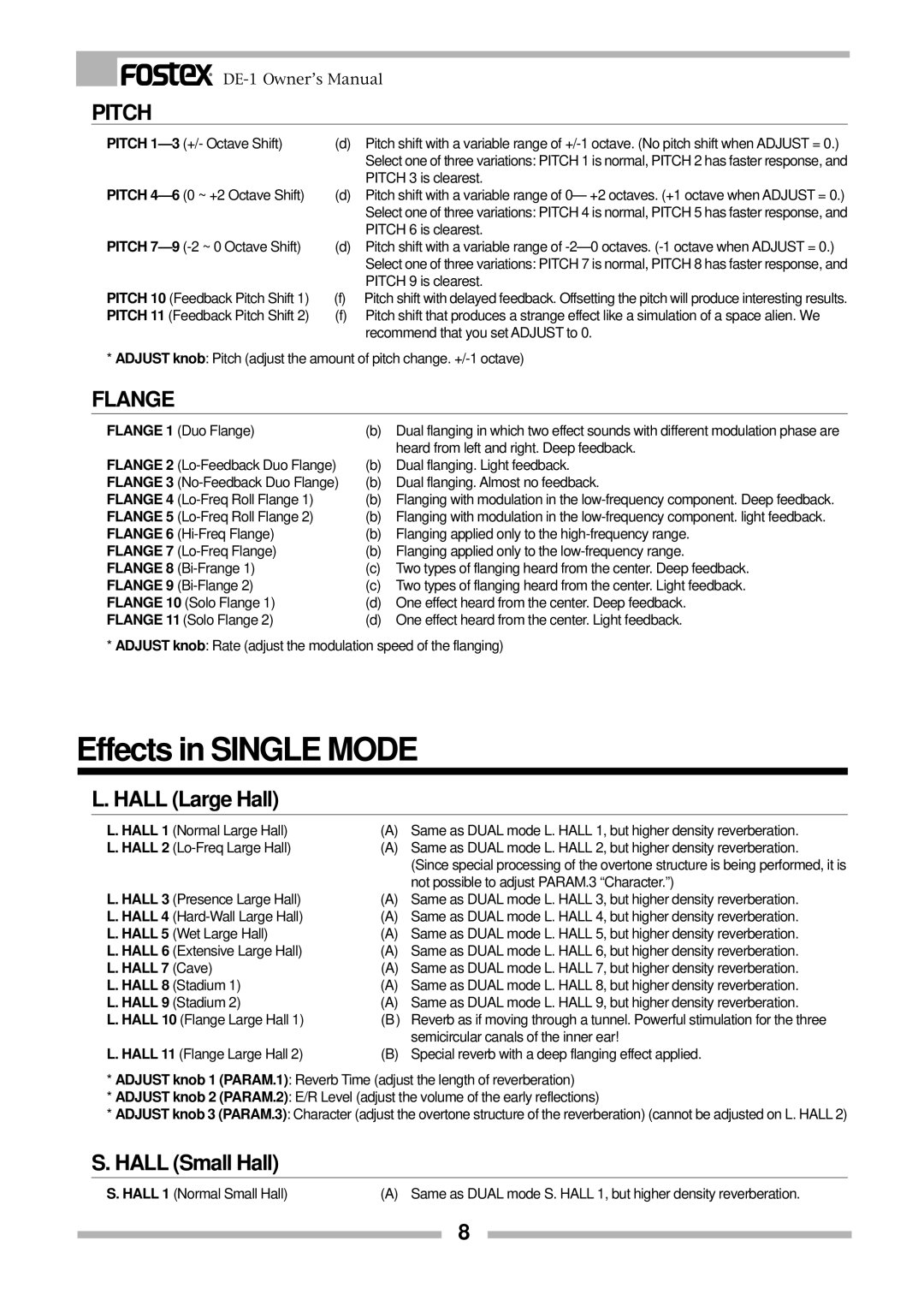
PITCH
PITCH | (d) | Pitch shift with a variable range of |
|
| Select one of three variations: PITCH 1 is normal, PITCH 2 has faster response, and |
|
| PITCH 3 is clearest. |
PITCH | (d) | Pitch shift with a variable range of 0— +2 octaves. (+1 octave when ADJUST = 0.) |
|
| Select one of three variations: PITCH 4 is normal, PITCH 5 has faster response, and |
|
| PITCH 6 is clearest. |
PITCH | (d) | Pitch shift with a variable range of |
|
| Select one of three variations: PITCH 7 is normal, PITCH 8 has faster response, and |
|
| PITCH 9 is clearest. |
PITCH 10 (Feedback Pitch Shift 1) | (f) Pitch shift with delayed feedback. Offsetting the pitch will produce interesting results. | |
PITCH 11 (Feedback Pitch Shift 2) | (f) | Pitch shift that produces a strange effect like a simulation of a space alien. We |
|
| recommend that you set ADJUST to 0. |
* ADJUST knob: Pitch (adjust the amount of pitch change.
FLANGE
FLANGE 1 (Duo Flange) | (b) | Dual flanging in which two effect sounds with different modulation phase are | |
|
|
| heard from left and right. Deep feedback. |
FLANGE 2 | (b) Dual flanging. Light feedback. | ||
FLANGE 3 | (b) Dual flanging. Almost no feedback. | ||
FLANGE 4 | (b) | Flanging with modulation in the | |
FLANGE 5 | (b) | Flanging with modulation in the | |
FLANGE 6 | (b) | Flanging applied only to the | |
FLANGE 7 | (b) | Flanging applied only to the | |
FLANGE 8 | (c) | Two types of flanging heard from the center. Deep feedback. | |
FLANGE 9 | (c) | Two types of flanging heard from the center. Light feedback. | |
FLANGE 10 (Solo Flange 1) | (d) | One effect heard from the center. Deep feedback. | |
FLANGE 11 (Solo Flange 2) | (d) One effect heard from the center. Light feedback. | ||
* ADJUST knob: Rate (adjust the modulation speed of the flanging)
Effects in SINGLE MODE
L. HALL (Large Hall)
L. HALL 1 (Normal Large Hall) | (A) Same as DUAL mode L. HALL 1, but higher density reverberation. | |
L. HALL 2 | (A) Same as DUAL mode L. HALL 2, but higher density reverberation. | |
|
| (Since special processing of the overtone structure is being performed, it is |
|
| not possible to adjust PARAM.3 “Character.”) |
L. HALL 3 (Presence Large Hall) | (A) Same as DUAL mode L. HALL 3, but higher density reverberation. | |
L. HALL 4 | (A) Same as DUAL mode L. HALL 4, but higher density reverberation. | |
L. HALL 5 | (Wet Large Hall) | (A) Same as DUAL mode L. HALL 5, but higher density reverberation. |
L. HALL 6 (Extensive Large Hall) | (A) Same as DUAL mode L. HALL 6, but higher density reverberation. | |
L. HALL 7 | (Cave) | (A) Same as DUAL mode L. HALL 7, but higher density reverberation. |
L. HALL 8 | (Stadium 1) | (A) Same as DUAL mode L. HALL 8, but higher density reverberation. |
L. HALL 9 | (Stadium 2) | (A) Same as DUAL mode L. HALL 9, but higher density reverberation. |
L. HALL 10 (Flange Large Hall 1) | (B) Reverb as if moving through a tunnel. Powerful stimulation for the three | |
|
| semicircular canals of the inner ear! |
L. HALL 11 (Flange Large Hall 2) | (B) Special reverb with a deep flanging effect applied. | |
*ADJUST knob 1 (PARAM.1): Reverb Time (adjust the length of reverberation)
*ADJUST knob 2 (PARAM.2): E/R Level (adjust the volume of the early reflections)
*ADJUST knob 3 (PARAM.3): Character (adjust the overtone structure of the reverberation) (cannot be adjusted on L. HALL 2)
S.HALL (Small Hall)
S. HALL 1 (Normal Small Hall) | (A) Same as DUAL mode S. HALL 1, but higher density reverberation. |
8
